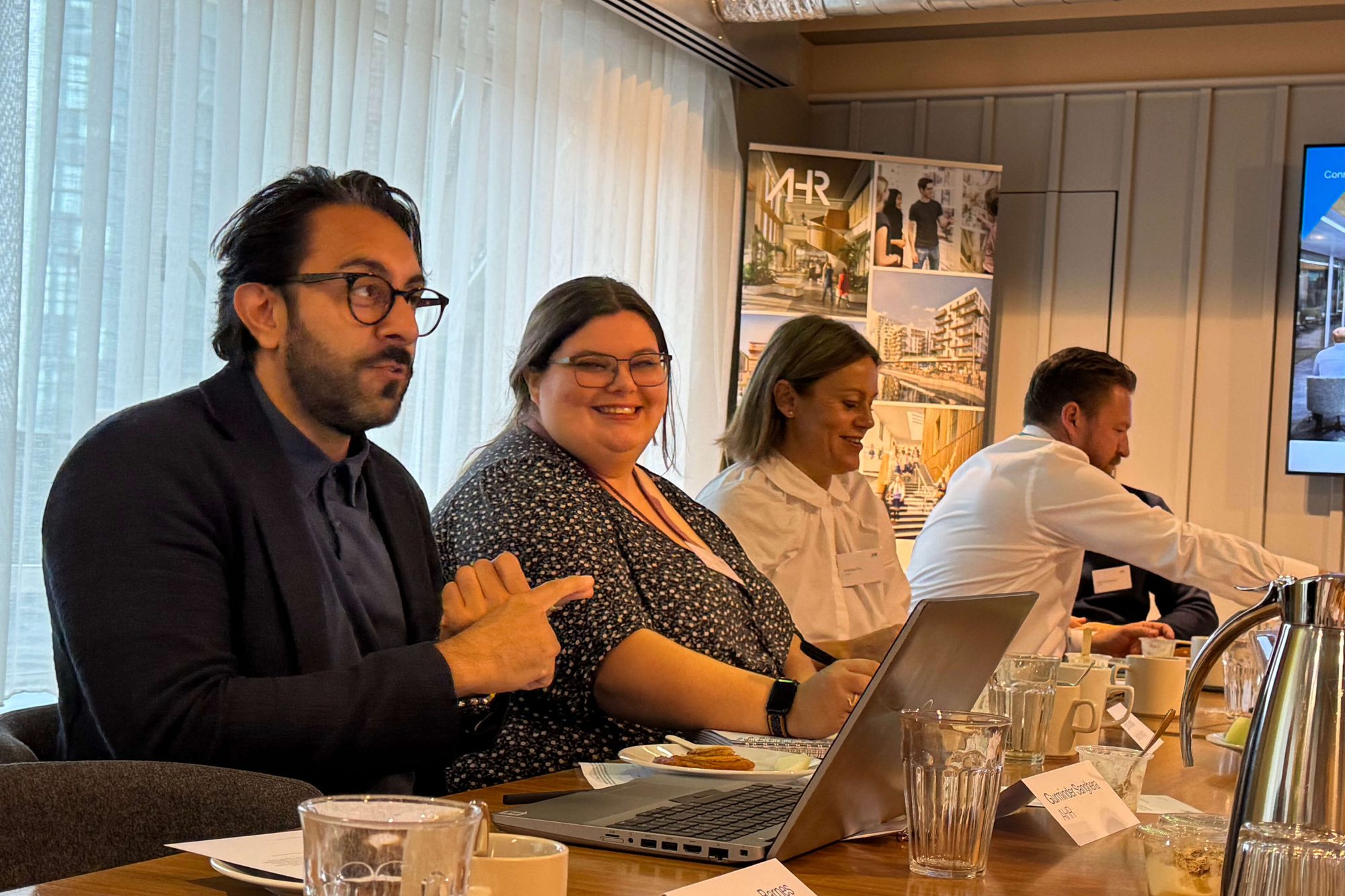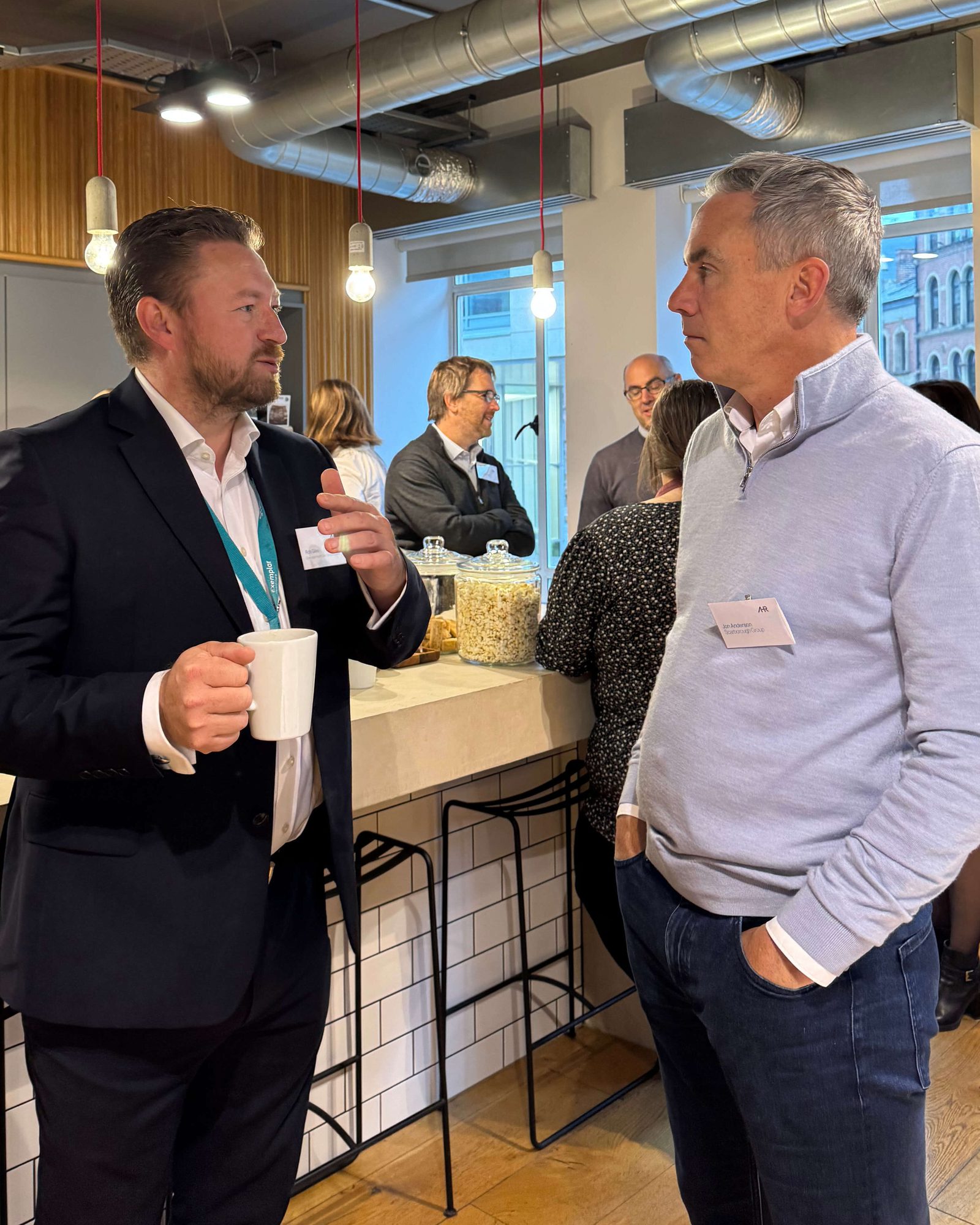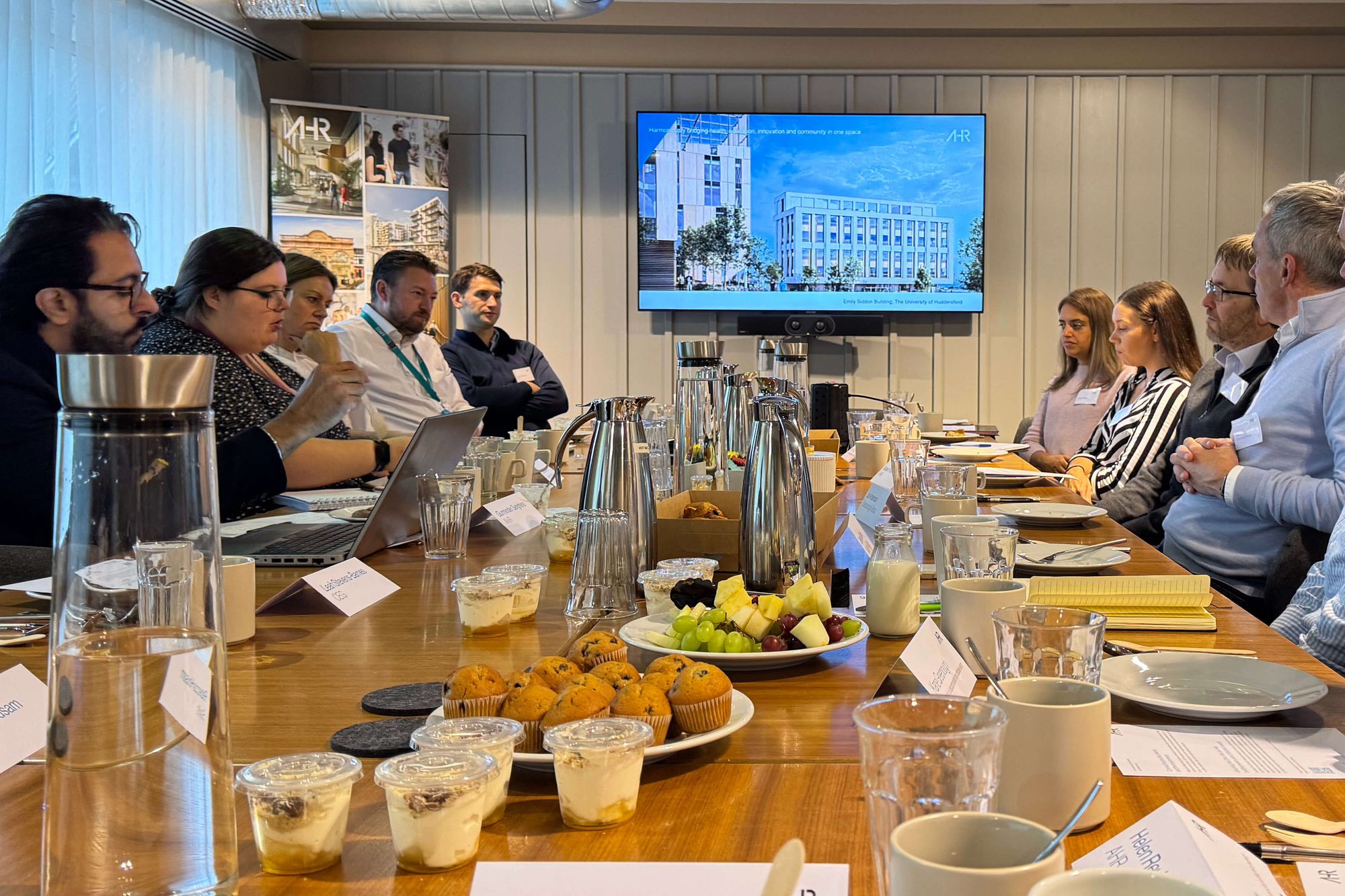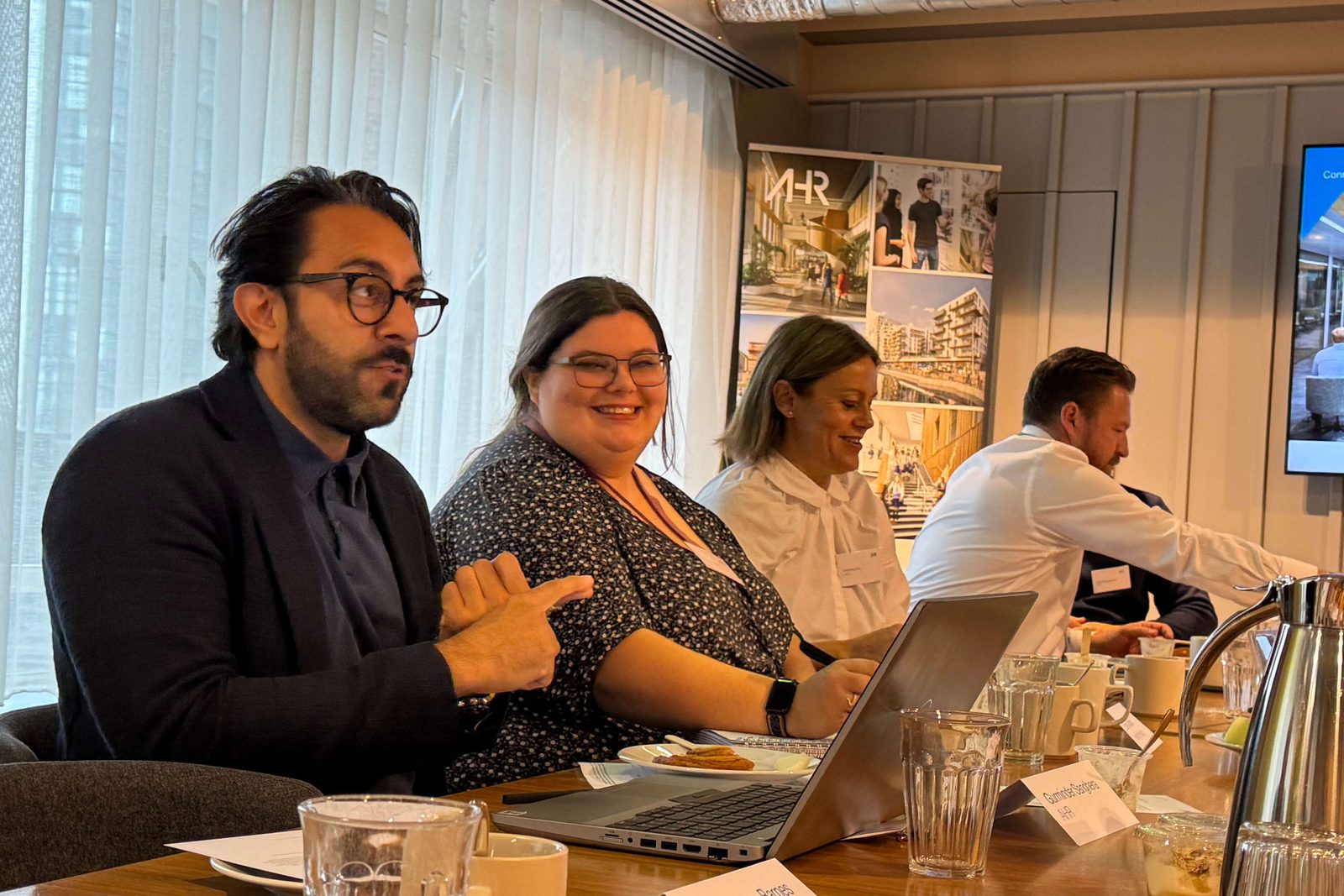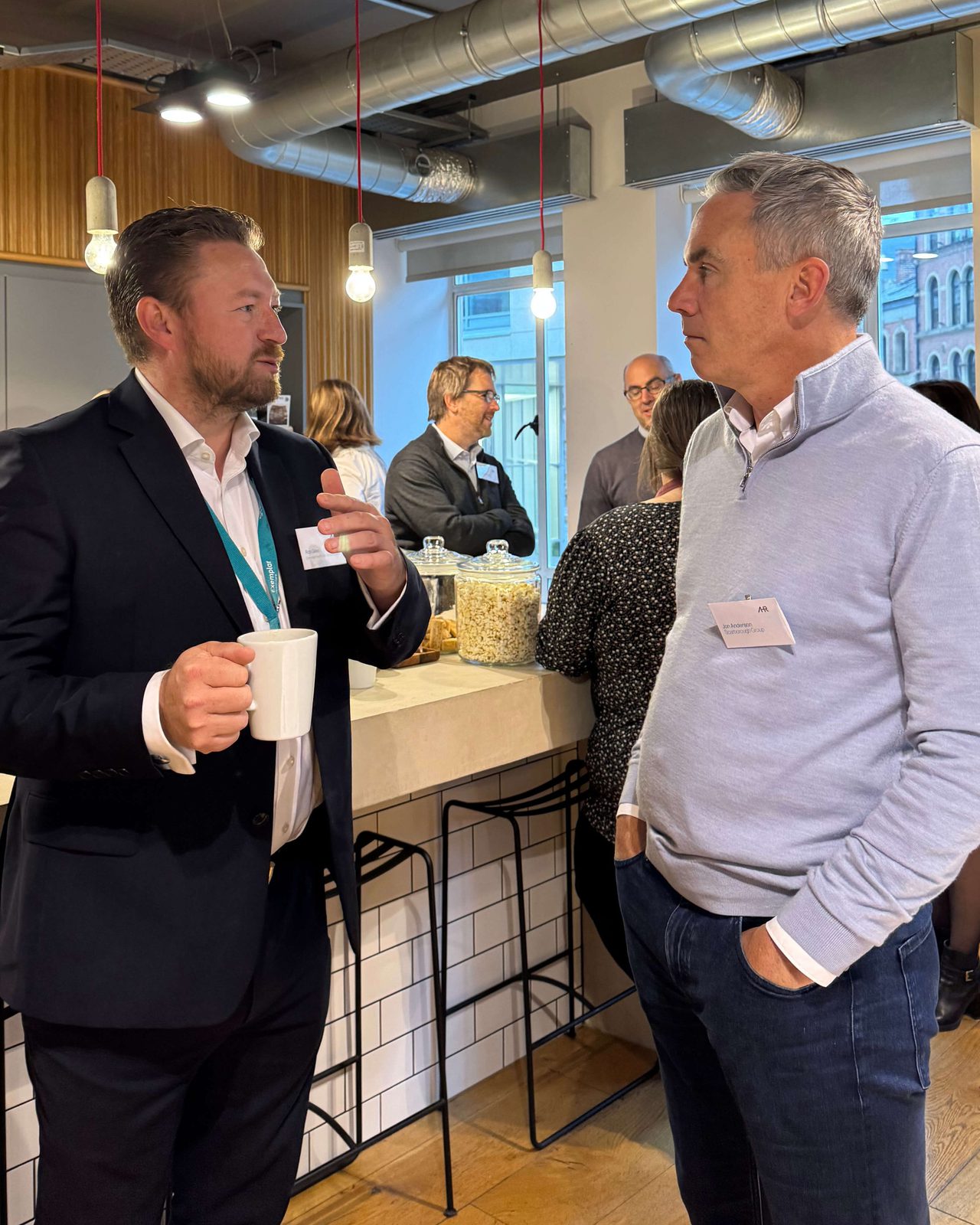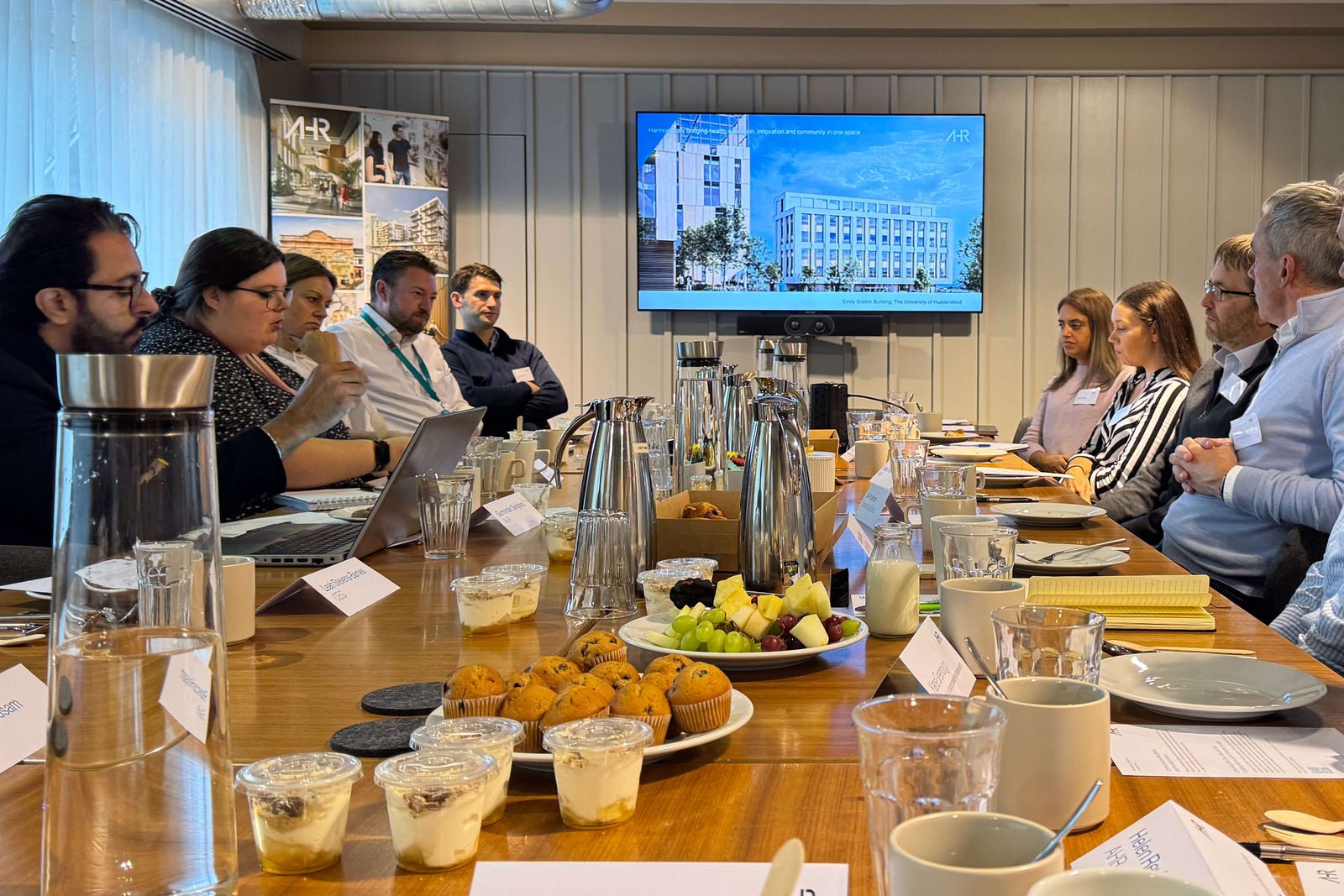
Practice News
Decarbonisation in Leeds: Tackling greenwashing and cost barriers
by AHR
As the UK edges closer to its 2050 net zero target, the construction and property industries are not only grappling with the scale of the challenge but also demonstrating a growing appetite for innovation and collaboration.
At our latest decarbonisation roundtable, hosted in our Leeds city centre office, we brought together housing associations, local planning directors, energy specialists, developers and architects for a constructive discussion full of practical insight into how our industry can accelerate meaningful change.
What emerged was a clear picture of a region that recognises its barriers, from viability and National Grid constraints to greenwashing and lagging regulation, yet remains determined to lead by example.
The conversation centred around two key themes:
- Materials matter – Exploring the latest advancements in sustainable materials, from bio-based innovations to circular economy strategies, and examining the key considerations, cost implications and best practices shaping low-carbon design.
- Powering the future – How the UK’s clean energy ambitions are influencing real estate, and how we can build greater resilience amid challenges around grid capacity, rising energy demand and the rapid growth of AI.
Scroll on to discover the key insights from the event.
1. Tackling greenwashing with education and leadership
The conversation opened with optimism about how the industry can move beyond greenwashing and raise the standard for transparency. While attendees acknowledged that misleading sustainability claims remain widespread, the focus was firmly on solutions and leadership.
Director Gurminder Sanghera, who chairs the Leeds Chamber of Commerce Sustainability Group, shared how the group is working with Leeds City Council to create clear, accessible guidance on embodied carbon — helping to build local knowledge and drive consistency ahead of national policy. This collaboration reflects the proactive mindset seen across Yorkshire’s built environment sector.
The discussion around Environmental Product Declarations (EPDs) reinforced this momentum. Far from viewing them as a compliance burden, attendees saw mandatory EPDs as a valuable way to create greater trust, transparency and accountability within the supply chain. Practical advice was shared on how to make the most of EPDs in specification - by asking the right questions, interrogating data and focusing on verified evidence rather than headline claims.
There was shared confidence that informed procurement can make a real difference. Choosing genuinely low-carbon products doesn’t have to cost more, attendees agreed, when design teams collaborate early and prioritise performance over perception. Across Leeds and Yorkshire, this approach is already taking hold, a sign that the region is not just challenging greenwash, but leading the way towards more open, evidence-based sustainability practice.
2. The challenge of viability
Viability remains one of the most talked-about challenges in delivering low-carbon projects. Yet the discussion in Leeds showed there is real confidence that sustainability and affordability can go hand in hand when carbon performance is considered from the very beginning.
Attendees shared encouraging examples of how early collaboration between clients, contractors and designers is helping to strike the right balance between cost and carbon. By setting clear, achievable energy and carbon targets early, teams can identify opportunities that deliver measurable benefits without increasing budgets, from fabric-first design to efficient procurement and simple ‘no-regrets’ interventions.
There was strong agreement that the focus must shift from short-term capital cost to whole-life value. Attendees highlighted how real-world data on energy use, maintenance savings and occupant wellbeing can make a powerful business case for investing in sustainable design.
A Leeds development was praised for showing this in practice, achieving timber construction and high EPC ratings within standard cost parameters, providing valuable lessons for future schemes.
3. National Grid constraints
Limited National Grid capacity is becoming a significant barrier to new development across Yorkshire, with long lead times and high connection costs shaping which schemes progress, and when.
Attendees shared experiences of projects stalled or redesigned due to grid limitations, prompting fresh thinking around local generation and demand management. The conversation turned to how smaller-scale, decentralised systems, from rooftop solar arrays and shared battery storage to microgrids and heat recovery, could reduce pressure on the grid and help deliver energy resilience.
There was strong support for more joined-up planning between local authorities, developers and utility providers to anticipate future demand and identify where renewable generation can be co-located with new growth. Several attendees noted that Leeds’ thriving digital and technology sector could play a key role here, using smart systems, data analytics and AI to balance energy use more effectively across developments.
4. Circular economy: Turning policy into practice
The circular economy was one of the most prominent themes of the Leeds roundtable, with widespread agreement that reusing existing materials is one of the quickest and most achievable ways to reduce carbon.
The group discussed the growing opportunities to repurpose structural steel, glass and aluminium — materials that can be repeatedly recycled without loss of performance. These examples reinforced the need to design for deconstruction and specify products with clear end-of-life pathways, ensuring today’s buildings become tomorrow’s resource banks.
Timber also sparked an interesting debate. While its use as a low-carbon material was strongly supported, attendees acknowledged that the UK still performs poorly when it comes to timber recovery and recycling. Much of the country’s timber waste is currently sent to landfill or incinerated, underlining the urgent need for better sorting, reuse and waste management infrastructure.
Leeds was recognised as being well placed to lead on circularity, with its Local Plan providing an opportunity to embed reuse and material retention policies into planning guidance. Several attendees spoke of active collaboration between local industry groups and the council to develop practical frameworks and guidance to make reuse a realistic option rather than an aspiration.
5. AI and energy demand: Anticipating the next wave
The rapid rise of AI and data-driven technologies is transforming every sector of the economy, but it also brings a significant new energy challenge. Attendees noted that the growing number of data centres and digital facilities across Yorkshire will dramatically increase electricity and cooling demands in the years ahead.
Rather than viewing this as a constraint, we saw a clear opportunity for smarter, joined-up energy planning. Leeds’ thriving digital sector, combined with its strength in innovation and research, positions the city to pioneer how technology and sustainability can work hand in hand.
The discussion focused on how waste-heat recovery, on-site renewable generation, battery storage and intelligent demand management could help balance energy use across both commercial and community developments.
Several also emphasised the role of data analytics and AI itself in optimising building performance, enabling systems that predict and respond to changing energy loads in real time.
6. Regulation: Preparing for the future
While attendees acknowledged that current regulation lags behind industry ambition, there was optimism that policy change is on the horizon. The proposed Part Z, mandating embodied carbon measurement, was seen as a potential game-changer.
In the meantime, the proactive role of local groups, from the Leeds Chamber of Commerce to housing associations and developers, shows that the region is not waiting for Westminster to act.
Looking ahead
Our Leeds roundtable reinforced that while the challenges are significant, the solutions are already within reach. Across Yorkshire, we see a sector that is motivated, collaborative and increasingly equipped with the knowledge to deliver real change.
Our series of decarbonisation roundtables, held across the UK, provide a platform for industry leaders, clients, developers, local authorities and housing associations to share perspectives, challenges and solutions.
Each event highlights how local innovation can feed into the national debate, and Leeds showed that Yorkshire is ready to play a leading role.
Explore more from our decarbonisation roundtable discussion series here
Frequently asked questions
We’re working closely with local authorities, developers and housing associations to shape buildings that balance carbon reduction with affordability. By embedding sustainability from the earliest stages, we help clients achieve measurable progress toward net zero across Leeds and the wider Yorkshire region.
We believe transparency drives real change. That’s why we champion Environmental Product Declarations (EPDs) and collaborate with the Leeds Chamber of Commerce and Leeds City Council to produce clear, accessible guidance on embodied carbon for the local construction community.
AI presents both challenges and opportunities. We’re working with partners in Leeds’ growing digital sector to explore how data analytics, smart systems and renewable integration can help manage demand and reduce emissions across developments.
Leeds has an incredible culture of collaboration. We see the city as a model for how local authorities, universities and private sector partners can work together to turn sustainability challenges into opportunities for innovation, resilience and measurable carbon reduction.
Posted on:
Oct 8th 2025
Topics:
Share on
Related Projects

Leeds Maths School
The creative reuse of the former Leeds Building Society Headquarters, to form a new post-16 school in the heart of the city centre.

Elizabeth Quarter
Flexible, agile and dynamic workspace alongside a 46-bed student accommodation wing, specifically for key workers.

Nexus
A prime example of our excellent technical delivery expertise, the new innovation and enterprise centre connects businesses with world-leading research expertise, facilities and talent.
Related News

Cross-sector ecosystems: Designing places for health innovation
Thought Leadership
13 Aug 25

An exciting milestone reached as the transformation begins on site at Base, the former Younger Building
Project News
17 Sept 25

Airedale Hospital appoints expert design team for new, state of the art healthcare facility
Project News
1 Jun 25
